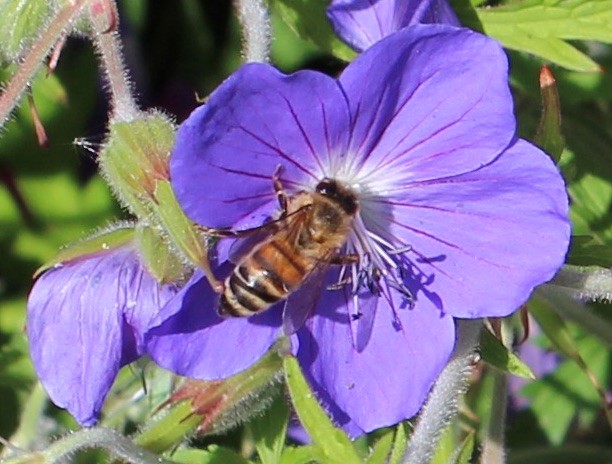Bee Blog January
January 2020
I am Gerald Bushby (pronounced bush bee!) a beekeeper in Weston on the Green, a small village in Oxfordshire. I am going to be writing a monthly blog about the bees in my apiary. I hope you will find it interesting. I should start by saying that I am not an expert, having only kept bees for three years. Anything I say is my own personal opinion; I accept that there may often be other views and opinions.
New year and the quiet time of year for the Beekeeper continues. I have found it very tempting all month to take a peep inside the hives just to make sure that the girls are still there. Luckily the last few days of the year have been exceptionally mild, so much so that on several days bees from all hives have been out flying. They are still there.
The BBKA 2019 Honey Survey results are in now and show that, on the whole, it has been a very good year for Beekeepers with an average yield per productive hive of 40.3 lbs, the best for more than 10 years and much higher than the 25-30 lbs per hive average for the last 10 years. Although there has been a continual upsurge in Urban Beekeeping the vast majority of hives, 60% of the total, are still kept in rural or countryside areas.
At this time of year I usually look back at what has happened in the past year and look forward to what I plan for the next.
I am afraid that the overriding event that is uppermost in my mind from the past year was a day in late spring when I was stung by one of my bees. Not so unusual as I had been stung many times in the past. It was all my fault. I had been inspecting the hives and had cleaned out some brace comb into an open container that I placed at head height on my water butt. The problem was that I forgot I had put it there and when I walked past it later in the afternoon, after I had removed my bee suit, some bees from the hives were feeding on honey in the comb. One of the bees saw me as a threat and attacked me stinging me in the corner of my mouth.
I was perhaps a little slow in removing the sting as it was entangled in my beard but within about a minute I felt itchy on my upper leg and then on my arm. I thought initially that I had been bitten by another bug but when my other arm started to itch as well I realised that this was not normal. I went into my house and started to remove layers of clothing to find numerous red very itchy swellings, some covering quite large areas over my skin and all becoming larger as I looked at them. What should I do??? Don’t panic. I dialled 111 for advice and recounted my symptoms, “we will send an ambulance” they said.
It is not until you see an ambulance arrive at your house for you that you think this is not good. What wonderful people the paramedics are; calm, reassuring and in possession of a supply of antihistamine which they proceeded to inject into my arm. The swelling started to subside, the itching became less. I had experienced a severe allergic reaction to the bee sting.
After a week or so all of the evidence of the reaction had passed. What to do next? The first thing was to do visit my Doctor and carry out a lot of internet research. Unfortunately there is no certainty as to what might happen the next time I am stung. My bodies reaction could be the normal reaction I have previously had to a sting or it could be worse and lead to a full anaphylactic shock.
At about this time I attended the Bees for Development Garden Party in London where, as I have mentioned in earlier Blogs I met and spoke to Martha Kearney, the Journalist. Martha had experienced a full blown anaphylactic shock some years before, being stretchered off to hospital. She told me that she had received immunotherapy treatment over a three year period which was very successful.
After several visits to my Doctor and Hospital I now walk around with an epipen in my pocket and I am very scrupulous in wearing protective clothing if I am near my bees. I have been accepted for a course of immunotherapy treatment but it does not start until late March.
I could give up keeping bees but I don’t want to. Its just going to be a little more difficult next year, but as my Father was fond of telling me when I was growing up, “nobody said life was going to be easy”.
I am a proud supporter of the ‘Bees for development’ charity, my love of the bee drew me to this wonderful UK based charity and the great work they do around the world with Bees and the impact they can have on people’s lives. Please help me support this wonderful organisation, as 2BScientific will be doing with donations to this hard-working charity.
